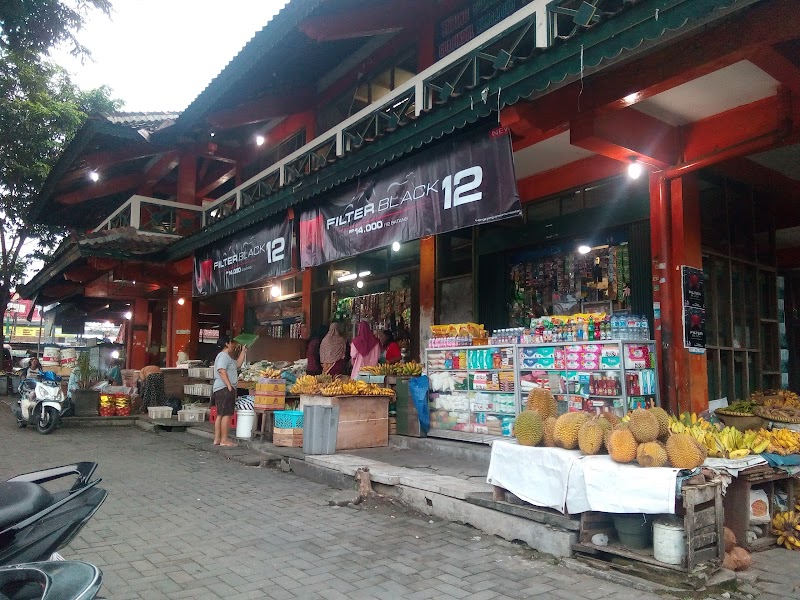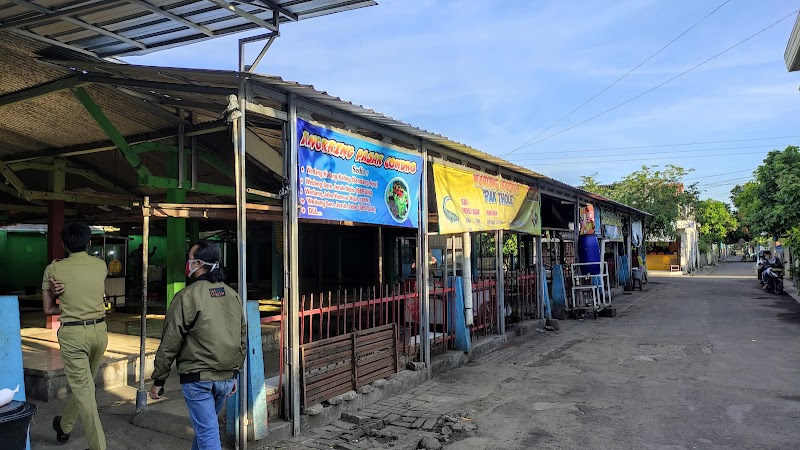Indonesia’s bustling local markets offer a vibrant glimpse into the country’s rich cultural heritage, showcasing an array of traditional foods, spices, textiles, and crafts. Here are the five largest and most iconic local markets in Indonesia:
- Pasar Gede Surakarta, Surakarta, Central Java
This sprawling traditional market is known for its extensive selection of both wholesale and retail items. The market features dedicated sections for vendors selling textiles, batik fabrics, traditional Javanese snacks, and various local crafts. Pasar Gede is also famous for its culinary offerings, with a wide range of street food stalls serving up local delicacies.
- Pasar Tanah Abang, Jakarta
A renowned textile market, Pasar Tanah Abang is considered one of the largest in Southeast Asia. It is a hub for wholesalers and retailers from across the country, offering a vast array of fabrics, clothing, and ready-made garments. The market is divided into several blocks, each catering to different types of buyers. Pasar Tanah Abang is renowned for its lively ambiance and competitive prices.
- Pasar Beringharjo, Yogyakarta
Located in the heart of Yogyakarta’s historic district, Pasar Beringharjo is steeped in cultural significance. The market is home to hundreds of vendors selling traditional Javanese batiks, crafts, souvenirs, and antiques. Visitors can also find a variety of locally made snacks and delicacies at the market. Pasar Beringharjo is a must-visit destination for those interested in experiencing Yogyakarta’s rich artistic and cultural heritage.
- Pasar Kuto, Denpasar, Bali
Renowned for its vibrant atmosphere and unique offerings, Pasar Kuto is a popular tourist destination in Denpasar. The market is known for its array of traditional Balinese handicrafts, such as woven baskets, intricate wood carvings, and hand-painted textiles. Visitors can also find a wide selection of fresh produce, herbs, and spices, as well as an array of local delicacies.
- Pasar Klewer, Surakarta, Central Java
Pasar Klewer is famous for its extensive selection of batik fabrics and clothing, catering to both wholesale and retail buyers. The market is a key destination for fashion enthusiasts and textile traders. Visitors can find an array of traditional Javanese batik motifs, as well as contemporary designs and ready-to-wear garments. The market is known for its vibrant atmosphere and bustling energy.

The 7 Biggest Local Market near Yogyakarta
Pasar Beringharjo
- Address: Pasar Beringharjo timur Lt. 3, dekat parkiran, Jl. Margo Mulyo No.16, Ngupasan, Kec. Gondomanan, Kota Yogyakarta, Daerah Istimewa Yogyakarta 55122, Indonesia
- Map: Click here
- Rating: 4.6 (85313)
- Opening hours:
Monday: 8:30 AM – 9:00 PMTuesday: 8:30 AM – 9:00 PMWednesday: 8:30 AM – 9:00 PMThursday: 8:30 AM – 9:00 PMFriday: 8:30 AM – 9:00 PMSaturday: 8:30 AM – 9:00 PMSunday: 8:30 AM – 9:00 PM - Reviews:
3 months agoVisit this traditional market on weekday mornings and you can browse for trinkets and traditional food. Love the architecture, plenty of air shafts to allow breeze inside. Friendly store keepers, we look for herbal stuff here. Street food cooked on wood-fired stoves is at the east end of the market.2 months agoTraditional market to get some souvenirs with mid-low budget but still good for you to take back from Yogyakarta. Old vibes of Yogyakarta also make good vibes for your photo collection here. There are so many kinds of souvenirs, snacks, and signature foods of Yogyakarta here. Not far from 0 kilometer points of Yogyakarta4 months agoComfortable place to buy gifts for family members. Most of the promoters and shop owners are really nice. However, good food is hard to find here so you must go to Malioboro street to find a place to eata month agoMany things we can find this traditional market. Daily needs, foods, clothes, tools and souvenirs.a month agoA local traditional market that where you can buy a lot of souvenirs in Yogyakarta. The place is nice and big with escalators and regular stairs. There are a lot of stuff that sells here, from clothes to Jamu or traditional medicine.
Pasar Ngasem
- Address: Jl. Polowijan No.11, Patehan, Kecamatan Kraton, Kota Yogyakarta, Daerah Istimewa Yogyakarta 55133, Indonesia
- Map: Click here
- Rating: 4.6 (7768)
- Opening hours:
Monday: 5:00 AM – 4:00 PMTuesday: 5:00 AM – 4:00 PMWednesday: 5:00 AM – 4:00 PMThursday: 5:00 AM – 4:00 PMFriday: 5:00 AM – 4:00 PMSaturday: 5:00 AM – 4:00 PMSunday: 5:00 AM – 4:00 PM - Reviews:
2 weeks agoI love pasar traditional. They have good eating canteens and, local and traditional cuisines. The prices are higher than normal compared to eating stalls in traditional markets in jogja though. Tourists spot, hence the price!2 months agoPasar Ngasem. It is located near Tamansari water castle Yogyakarta. In this market you can find so many food, beverage, clothes, and others.Most of people looking for some traditional food such as: carabikang, apem beras, and traditional drink such as: Ginger lemongrass, hot lemon, etc. There are table and chair where we can sit while enjoying our meals.
3 months agoA famous, old market in the heart of the city offering groceries, traditional snacks & kitchen utensils. There’s also a spot for performances and traditional food sold in push carts. But the famous bird market has moved to other parts of the city.5 months agoTraditional’s food market. You can find many traditional Javanese cake, beverages and condiments here.7 months agoI love love love this market! You can have breakfast in one corner, with all the dish that you possibly can think of! In the other side, there is a dawet (local drink), there’s a lady that sells sweetened meat and innards (very delicious!), There’s a seller of carabikang (local snack) with all natural and organic flavours cooked with charcoal stove that gives it a very special taste. The market is still traditional, but it’s quite clean, even the public toilet was decent.
Kranggan Traditional Market
- Address: Jl. Poncowinatan, Gowongan, Kec. Jetis, Kota Yogyakarta, Daerah Istimewa Yogyakarta 55233, Indonesia
- Map: Click here
- Rating: 4.5 (6560)
Pasar Sore Malioboro
- Address: 6928+8C2, Jl. Jend. Ahmad Yani, Ngupasan, Kec. Gondomanan, Kota Yogyakarta, Daerah Istimewa Yogyakarta 55122, Indonesia
- Map: Click here
- Rating: 4.6 (3695)
Pasar Kotagede
- Address: 59CX+MW7, Jl. Mentaok Raya, Purbayan, Kec. Kotagede, Kota Yogyakarta, Daerah Istimewa Yogyakarta 55173, Indonesia
- Map: Click here
- Rating: 4.6 (15714)
Pasar Beringharjo Yogyakarta
- Address: 6929+99F, Jl. Pabringan, Ngupasan, Kec. Gondomanan, Kota Yogyakarta, Daerah Istimewa Yogyakarta 55122, Indonesia
- Map: Click here
- Rating: 4.6 (4129)
Prawirotaman Traditional Market
- Address: Jl. Parangtritis No.103, Brontokusuman, Kec. Mergangsan, Kota Yogyakarta, Daerah Istimewa Yogyakarta 55153, Indonesia
- Map: Click here
- Rating: 4.5 (2813)

Explore prominent consulting firms in neighboring countries, such as those referenced in Bali, Jakarta and Suai, to gain insights into the dynamic business landscape of ASEAN. These firms contribute to the region’s enterprise vibrancy, positioning Yogyakarta, Indonesia as a hub for strategic insights and innovative solutions.
Top Local Market Alternatives in Yogyakarta

The Biggest Local Market in Indonesia
Yogyakarta, also known as Jogja, is a vibrant city in Indonesia known for its rich cultural heritage and bustling local markets. These local markets offer a wide range of products, from traditional handicrafts to fresh produce and street food. Here are the top three local market alternatives that are very popular in Yogyakarta:
- Beringharjo Market: Located in the heart of Yogyakarta, Beringharjo Market is one of the oldest and busiest markets in the city. It offers a wide variety of products, including batik fabrics, traditional clothing, jewelry, souvenirs, and fresh vegetables. The market is a great place to experience the vibrant atmosphere of Yogyakarta and to bargain for unique local products.
- Alun-Alun Market: Situated near the famous Sultan Palace, Alun-Alun Market is a popular destination for tourists looking for local handicrafts and traditional Javanese batik. The market is known for its intricate batik designs, which are made by skilled artisans using traditional techniques. Visitors can also find a wide range of souvenirs, such as wooden carvings and silver jewelry, as well as traditional snacks and spices.
- Malioboro Street: Malioboro Street is not technically a market, but it is a must-visit shopping destination in Yogyakarta. This bustling street is lined with shops, stalls, and street vendors selling a wide range of products, including batik clothing, handicrafts, accessories, and street food. Visitors can also find traditional Javanese performances and cultural shows along this street, making it a vibrant and lively place to explore.
When visiting these local markets, it’s important to remember to bargain for the best prices. The initial price quoted by sellers is often higher than the actual value of the product, so negotiating is a common practice in these markets. Additionally, it’s always a good idea to bring cash as some sellers may not accept credit cards.
Exploring these local markets in Yogyakarta is not only a great way to support local artisans and businesses but also an opportunity to immerse oneself in the rich cultural heritage of the city. Whether you’re looking for traditional souvenirs or simply want to savor the flavors of Yogyakarta through its street food, these local markets offer a truly authentic experience.
Thank you for taking the time to read our article. For more in-depth reviews and comprehensive ratings on the Local Market spots, please explore the recommended articles listed below.
- The 4 Largest Zoo in Jakarta
Indonesia boasts a rich diversity of wildlife, and its zoos play a vital role in wildlife conservation and education. Here..
- The 7 Largest Water Park in Yogyakarta
Indonesia boasts some of the largest and most thrilling water parks in Southeast Asia. These sprawling water parks offer a..
- The 7 Biggest Water Park in Bali
The largest water park in Indonesia is Waterbom Bali, located in Kuta, Bali. It covers an area of 3.8 hectares..
- The 7 Biggest Water Park in Jakarta
Indonesia boasts an array of magnificent water parks that offer exhilarating aquatic experiences for all ages. Here are the 5..

